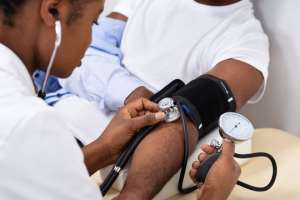
Dr. Alfred Doku, Head of Cardiology at the Korle-Bu Teaching Hospital, is advising men living with hypertension to seek medical guidance on appropriate treatment plans that won’t interfere with their sexual health.
“There are alternative medications available that may not impact sexual activity. So, I will encourage all men to consult with healthcare experts to find suitable treatment options, which will enable them to live longer for themselves and their families. You may be on top and collapse and die so it must be taken seriously,” he emphasized.
Dr. Doku made the appeal as part of an ongoing campaign to raise public awareness about hypertension and its dangers. His call comes at a time when Ghana continues to record high cases of the condition, often referred to as the “silent killer.”
The Greater Accra Regional Health Directorate, as part of efforts to promote preventive healthcare, held an outreach event at the Mamprobi Polyclinic on May 22. The program aimed to educate the public on the importance of regular blood pressure monitoring and lifestyle changes.
Dr. Robert Amesiya, the Greater Accra Regional Director of Health Services, also urged Ghanaians to be proactive about their health.
“Hypertension is a silent killer and so I will encourage everyone to at least check their hypertensive status once a year. And religiously take their medications,” he advised.
Hypertension remains one of Ghana’s most pressing health concerns, contributing to heart disease, stroke, and other life-threatening complications. Experts continue to emphasize the need for widespread public education, routine health screenings, and adherence to prescribed treatments to help curb its growing impact.
Hypertension remains a significant public health issue in Ghana, affecting over a quarter of the adult population.
Approximately 27% of Ghanaian adults are reported to have hypertension, with similar rates in rural and urban areas.
Only about 35% of individuals with hypertension are aware of their condition, and merely 6% have their blood pressure under control. The prevalence of the disease is said to be higher in the coastal communities.
Common risk factors contributing to hypertension in Ghana include, Obesity, Physical Inactivity, Unhealthy Diet and Old Age.


